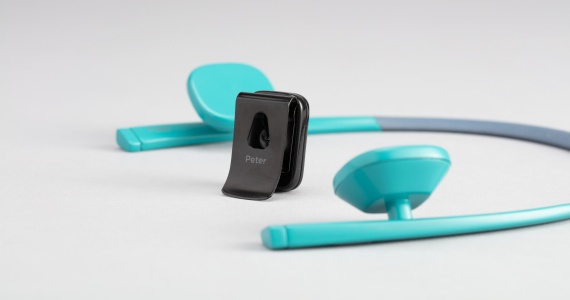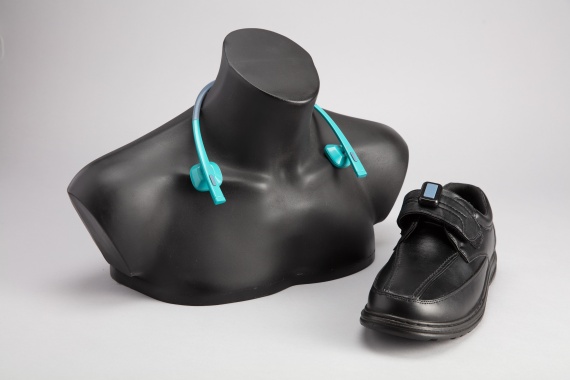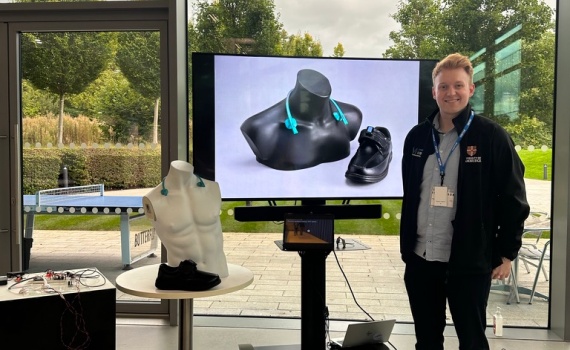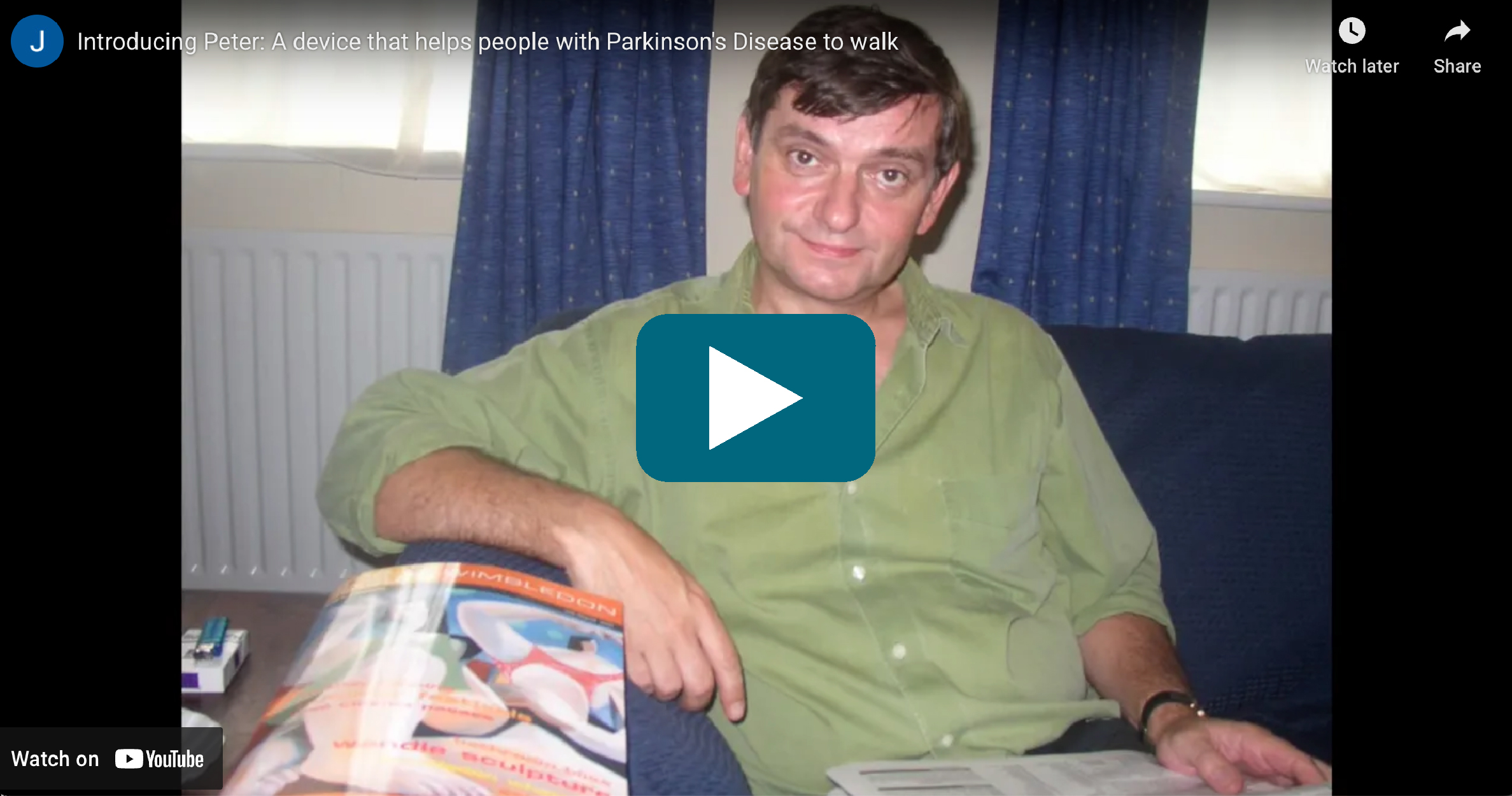ISMM Student shortlisted for the 2024 James Dyson Award for Parkinson’s device

Jonathan Fisher, who participated in the 2023/2024 cohort for the MPhil in Industrial Systems, Manufacture, and Management (ISMM) at the Institute for Manufacturing (IfM) has been shortlisted for the 2024 James Dyson Award for his wearable biomedical device, Peter. The device is designed to help people suffering from Parkinson’s disease to regain their ability to walk by alleviating the symptoms of freezing of gait.
Introducing Peter
Parkinson’s disease is a neurodegenerative disorder that affects over 10 million people worldwide, with 1 in 37 people expected to be diagnosed in their lifetime. The condition can cause more than 40 debilitating symptoms, which robs sufferers of their independence and quality of life over time. Inspired by watching the impact the disease had on his father’s life, Jonathan made it his mission to alleviate one of the most debilitating symptoms, freezing of gait. This unpredictable symptom causes suffers to suddenly lose the ability to walk, their legs “freezing” as if glued to the floor for several minutes. This severely impacts independence and quality of life and often leads to falls and accidents.
His solution is Peter. Named after his father, Peter is a wearable biomedical device that helps to alleviate freezing of gait and has recently been shortlisted in the global top 20 for the 2024 James Dyson Award. The award recognises outstanding inventions by young engineers and designers globally, providing the winner with a cash prize to help advance their invention.
“Sir James Dyson is one of my heroes, so knowing he will personally review my design is an incredibly exciting moment,” says Jonathan. “The support, exposure, and recognition from this award will elevate Peter’s development and open doors to connections and opportunities that I wouldn’t have had otherwise.”
This announcement builds on the device's earlier success. Peter won the 2023 New Designer’s “Formula 2GX Passionately Purposeful Creative Innovators Award” and was shortlisted for both the Joseph Joseph and DCA New Designer’s Awards.
Award winning design
The device is simple and discreet in design, comprising of a neckband worn touching the collarbones and a sensor attached to the wearers shoe. The sensor automatically detects when your leg has stopped moving and sends a signal to the neckband, triggering it to play a rhythmic signal. This signal has previously been proven to alleviate the symptoms of freezing of gait without the need for medication.

“While simple, the concept is effective and provides an ‘invisible’, discrete and user-friendly solution to millions of people around the world suffering from Parkinson’s Disease,” explains Jonathan.
Although it may appear to be a simple solution, its impact on users is significant and far-reaching. Parkinson’s medication becomes less effective over time, so delaying its use can lead to a better quality of life for a longer period. The use of non-invasive technology, like Peter, helps manage symptoms and reduces the need for medication.
Professor Roger Barker, a Parkinson’s expert at the University of Cambridge and Addenbrooke’s Hospital, says, “Walking problems are a major issue for many patients with Parkinson’s disease. Better ways of treating it are urgently needed and this promises to be an exciting new approach.”
The device can also significantly increase quality of life, fostering confidence, independence and freedom.
“Walking is such a big thing”, says Jonathan, “it allows you to integrate into society and gives you so many more options for what you can do. The ability to be active, be involved in communities and maintain independence for as long as possible is such a positive for Parkinson’s suffers, both physically and mentally.”
The design process started during his undergraduate studies in Product Design at Brunel University, where he saw a gap in the market for a low-cost, discreet and accessible solution to freezing of gait. While solutions exist, they are bulky, expensive and play a constant signal which is less effective and annoying for users. Peter went through many iterations before the design was finalised, using dismantled headphones, Velcro and foam models and 3D-printing to test and refine all aspects of the device.
Jonathan involved users and experts at every stage of the design process, soliciting feedback from patients, caregivers and medical professionals to inform the user-friendliness and comfort of the design. Final forms of the device were tested with empathy tools to simulate Parkinson’s symptoms to ensure its suitability.
Impactful learning leads to impactful people
While the initial design was completed as part of his undergraduate studies, he attributes much of his onward journey with Peter to the ISMM Programme at the IfM. In particular, the broad content of the curriculum and considerations for all the factors needed to bring a product to market. The programme was recommended to him by a former manager and ISMM alum, who attributes its impact on the success of their own career and knew Jonathan would benefit from the broader education in manufacturing and management it offers.
“The course has given me the confidence to take the venture forward. The exposure to different topics, meeting an amazing network of people and the skills I have gained have been invaluable in my ability to take this product further” he says. “There are so many talented and amazing people at the IfM and, studying on the ISMM programme, they are all available and enthusiastic to talk to you about their work.”
In particular, he credits Course Director Florian Urmetzer for his encouragement in applying for the James Dyson Award. It was under his recommendation and support that Jonathan submitted the application and had the skills and confidence to pitch Peter to the awards judging panel.

“Before taking part in the ISMM programme, I would have been daunted by pitching the device to the judging panel. However, as part of the course we were presenting to academics and industrial professionals almost weekly. Pitching to the judging panel almost felt like an everyday occurrence and enabled me to present the device at its best”.
Accelerating innovation
Spurred on by Peter’s early success and the confidence and skills built during the ISMM programme, Jonathan is determined to see his product through to market.
He has recently been accepted to the Accelerate Cambridge programme at the Judge Business School, which was introduced to him through ISMM. Accelerate Cambridge offers a structured approach of 3-month programmes that combine entrepreneurship training, regular coaching and mentoring, as well as access to shared workspace. The programme will support him to seek funding, advance development through user testing and build a team.
“User testing will be assisted by Parkinson’s Disease experts at Addenbrooke’s Hospital, including the head of a Parkinson’s Disease Research Group and a consultant neurologist. Both have verified this concept would work. Successful trials would lead to further funding rounds for mass clinical trials, certification and production,” explains Jonathan, “I’m excited to see what the future holds!”.
|
If you are interested to learn more about Peter or discuss potential collaborations, you can connect with Jonathan on LinkedIn: www.linkedin.com/in/jonathanlukefisher/ |
 |










